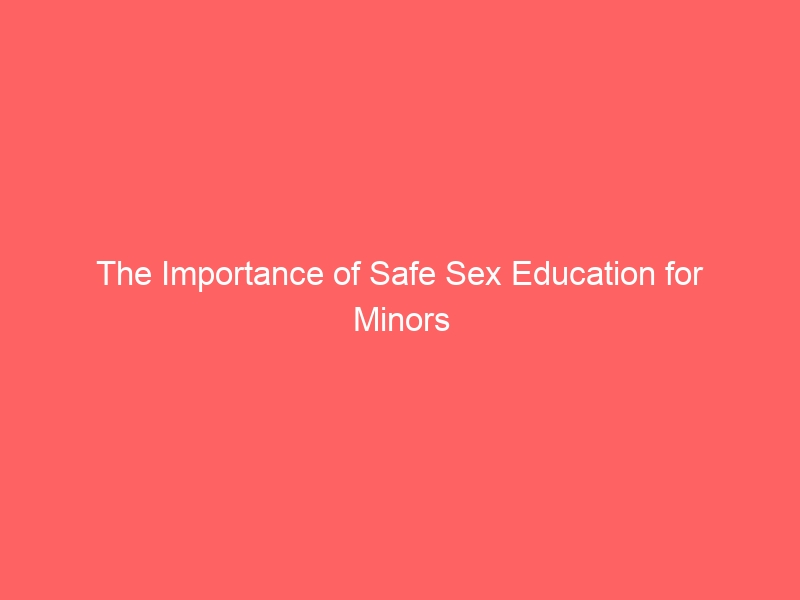When it comes to safe sex education for minors, we often find ourselves navigating a complex landscape of information and misconceptions. We know that understanding consent and healthy relationships is crucial for their development, yet many parents feel uncertain about how to approach these conversations. One question that frequently arises is, "Can minors buy condoms?" We believe it’s essential to address such queries while debunking myths that may hinder effective education. By fostering open discussions, we can empower the next generation to make informed choices about their sexual health.
The Role of Parents in Safe Sex Education
Parents play a crucial role in providing their children with accurate information about safe sex practices. It’s our responsibility to create an open environment where discussions about sex aren’t taboo. We should encourage our kids to ask questions and express their concerns without fear of judgment. By being honest and informative, we can help them understand the importance of protection and consent. We’ve got to lead by example and demonstrate healthy attitudes towards relationships. This foundation can empower them to make informed choices in their lives. As we guide them through these conversations, we also need to transition into teaching them about understanding consent and healthy relationships.
Understanding Consent and Healthy Relationships
Understanding consent and healthy relationships is something we all need to prioritize in our discussions about safe sex education. We’ve got to ensure that everyone understands the importance of mutual respect and communication. It’s essential for us to teach young people that consent isn’t just about saying yes or no; it’s about ongoing agreement. We’ve seen how healthy relationships can empower individuals and foster a sense of security. When we talk about consent, we’re not just discussing boundaries; we’re creating a culture of trust. We should encourage open conversations about feelings and expectations. Ultimately, we’re helping to build a foundation for healthier future relationships.
Addressing Myths and Misconceptions
We’ve got to clear up the myths and misconceptions surrounding safe sex to ensure everyone is informed. Many folks think that safe sex is only about condoms, but it’s much more than that. Some believe that if they’re in a monogamous relationship, they don’t need to worry about safe practices. Others think that only certain sexual orientations need to be concerned about STIs. We often hear that if someone looks healthy, they can’t possibly have an infection. It’s crucial to understand that age doesn’t determine whether someone needs education on safe sex. Lastly, there’s a common myth that discussing safe sex is awkward or unnecessary, when in reality, it’s an essential conversation for everyone.
The Impact of Comprehensive Sex Education Programs
Comprehensive sex education programs significantly improve our knowledge and awareness about safe practices. They equip us with the tools to make informed decisions regarding our bodies and relationships. We’re more likely to communicate openly with partners when we’ve received proper education. These programs help reduce the rates of STIs and unintended pregnancies among minors. We also gain a better understanding of consent and respect in relationships. Schools that implement these programs foster a healthier environment for all students. Ultimately, we’re empowered to take charge of our sexual health and well-being.
Resources for Educators and Caregivers
Access to diverse resources for educators and caregivers can significantly enhance our ability to provide effective safe sex education for minors. We’ve got access to various websites, books, and workshops that offer valuable information. It’s essential for us to stay updated with the latest research and trends in sexual health education. Many organizations provide free materials and curriculum guides to help us teach these important topics. We can also connect with local health professionals who can assist us in delivering accurate information. By sharing resources among ourselves, we can create a more comprehensive learning environment. Together, we’re better equipped to address the needs and questions of our youth regarding safe sex practices.
Frequently Asked Questions
What are the legal age requirements for discussing safe sex with minors?
When it comes to discussing legal age requirements for talking about safe sex with minors, we’ve got to consider that laws can vary by location. Generally, we’re encouraged to approach these discussions responsibly and ensure that anyone involved understands the importance of consent and education.
How can schools effectively implement safe sex education programs?
To effectively implement safe sex education programs, we should create a comprehensive curriculum that engages students and addresses their specific needs. It’s important for us to involve parents and the community in the process, ensuring everyone understands the benefits of these programs.
What are the potential consequences of not providing safe sex education to minors?
If we don’t provide safe sex education to minors, we risk increased rates of sexually transmitted infections and unintended pregnancies. It’s crucial that we equip young people with the knowledge they need to make informed decisions about their sexual health.
Conclusion
In recognizing the significance of safe sex education for minors, we understand that our roles as parents, educators, and caregivers are pivotal. By fostering open dialogue and providing accurate information, we can empower young individuals to make informed choices about their sexual health. It’s essential to challenge misconceptions and normalize discussions around safe practices to create a more supportive environment. Together, we can ensure that comprehensive education programs are accessible and effective in promoting healthy relationships and consent. Ultimately, our collective efforts will lead to a generation that values respect, safety, and informed decision-making in their intimate lives.
For those interested in safe sex education, it’s crucial to understand the potential risks associated with condom use, including the possibility of them getting stuck. To learn more about this important topic, I highly recommend visiting the webpage on this subject at can a condom get stuck in a mans ass. It’s an informative resource that can help enhance your knowledge and promote safer practices.
